News Center
China’ s Largest Solar & LNG Dual-Fuel Vessel “YUAN HAI KOU” Sets Sail
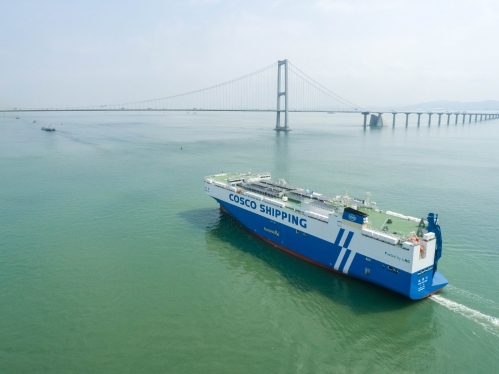
On May 15, the LNG dual-fuel car carrier “YUAN HAI KOU”, a fleet addition by Guangzhou Yuanhai Auto Carrier—a subsidiary of COSCO SHIPPING Specialized—undertook its maiden voyage from the Nansha Auto Port in Guangzhou. Stretching 199.9 meters in length and equipped with 12 car decks (4 of which are adjustable), the “YUAN HAI KOU” is designed to accommodate a diverse array of vehicles, including commercial trucks, engineering machinery, buses, and MAFI cargo.
Who embarked on this journey as passengers? The “YUAN HAI KOU”, laden with roughly 4,000 vehicles from prominent Chinese automakers like BYD, Chery, Geely, Yutong, Zoomlion, Xiamen King Long, and Sany, is destined for nations in the Belt and Road regions, including Greece, Turkey, Italy, and Tunisia among others.
What route does the ship take? Embarking on its maiden expedition along the “China-Mediterranean” maritime corridor, the “YUAN HAI KOU” completes a single voyage in approximately 30 days—a duration nearly one-third shorter than conventional routes. This expedited transit significantly curtails transit times for auto manufacturers. Leveraging Piraeus Port as a central hub within its feeder network, the route’s service scope extends to many European nations, including France and Spain, alongside major North African countries and ports in the Black Sea region.
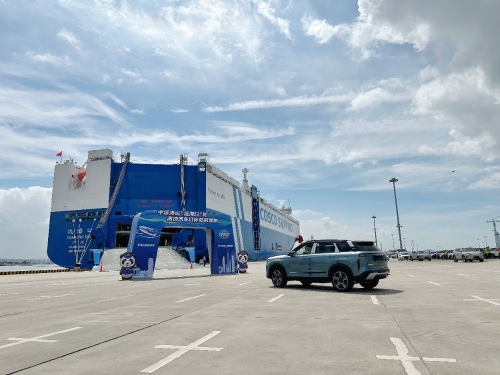
As the worl’s first vessel to fully comply with China Classification Society’s (CCS) “Safety Technical Guidelines for New Energy Vehicle Roll-on/Roll-off Transport,” the “YUAN HAI KOU” redefines industry standards through its commitment to green practices, intelligent safety features, and digital innovation.
Green and Low-Carbon Practice
At the heart of the “YUAN HAI KOU” lies a trifecta of eco-friendly technologies—“LNG clean energy, photovoltaic power, and shore power connectivity.” This integrated approach establishes a comprehensive low-carbon operational framework.
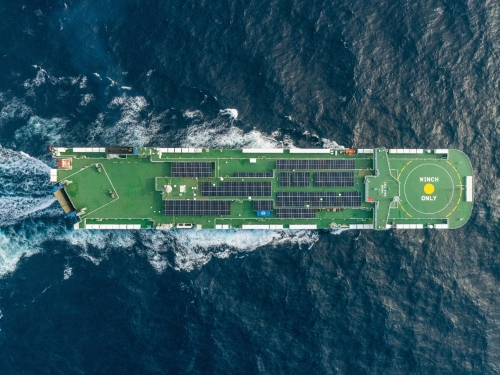
Powered by an internationally acclaimed LNG dual-fuel engine, the “YUAN HAI KOU” outperforms conventional fuel-powered vessels in terms of efficiency and environmental impact. It achieves around 20% energy savings, slashing carbon emissions by approximately 27%, nitrogen oxides by 30%, sulfur compounds by 99%, and particulate matter (PM) by over 90%. Once operational, this vessel is projected to realize a carbon reduction rate exceeding 24%. Illustratively, on a standard round trip between China and Europe, substituting LNG for traditional fuels results in a reduction of more than 2,100 tons of CO2 per journey, cementing its status as a paragon of clean maritime propulsion.
Equipped with the globe’s most extensive shipborne photovoltaic system, the “YUAN HAI KOU” boasts a 302.8kWp distributed solar grid. This pioneering installation generates an annual yield of 410,000 kilowatt-hours, translating to a fuel conservation of approximately 111 tons and a CO₂ mitigation of 345.9 tons yearly—equivalent to the carbon sequestration capacity of roughly 38,000 trees (calculated based on a single tree’s annual carbon sequestration of 9 kg). Consequently, it orchestrates a self-sustaining green energy cycle featuring “solar harvesting and fuel displacement.”
Embracing a medium-voltage shore power interface, the vessel ensures zero-emission operations while docked, slashing daily CO2 output by around 21 tons. Complemented by innovative energy-saving enhancements like anti-vortex fins and twisted rudder designs, its Energy Efficiency Design Index (EEDI) stands unparalleled, achieving a lifecycle carbon intensity reduction of nearly 35% versus conventional counterparts.
Smart and Safe
In alignment with CCS’ “Safety Technical Guidelines for New Energy Vehicle Roll-on/Roll-off Transport,” the “YUAN HAI KOU” has erected a robust triad of safety pillars: “technology standards, and practice.”
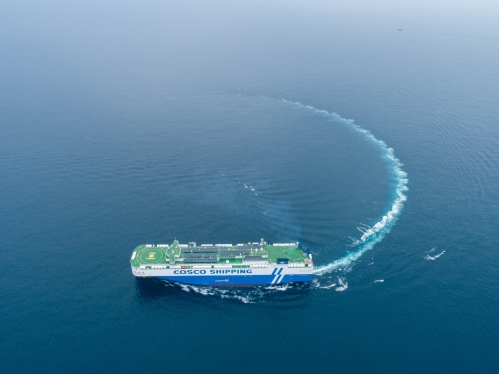
It pioneers fire risk management for lithium-ion and hydrogen vehicles through compartmentalization, tailored fire suppression systems, and cargo hold thermal imaging surveillance, earning China’s inaugural PCTC the prestigious “NEV Carriage” endorsement.
Deeply engaged in drafting CCS’s “Safety Technical Guidelines for New Energy Vehicle Roll-on/Roll-off Transport,” COSCO SHIPPING’s PCTC fleet division has bridged domestic gaps, setting avant-garde benchmarks in fire prevention, electrical safeguards, battery protection, and cabin ventilation that surpass current international norms.
On May 1, in tandem with the Marine Design and Research Institute of China, COSCO SHIPPING spearheaded the greenlighting of “Fire monitoring and Alert Technology for Electric Vehicles on Ships and Its Testing Methods” at the ISO/ISE plenary, steering the global NEV transport sector towards standardized, evidence-based governance from experience-driven management.
Leveraging COSCO SHIPPING’s proprietary PCTC loading software, the “YUAN HAI KOU” instantaneously logs each vehicle’s position upon embarkation, enabling real-time data tracking. Its “vehicle-code-location” intelligent framework expedites emergency vehicle localization, bolstering fire containment and crisis response efficacy.
Digital Innovation
As the pioneering vessel adhering to CCS’s “Digital Ship Delivery Guidelines,” “YUAN HAI KOU” has realized seamless data interoperability across design, construction, and inspection phases. Implementing a unified “One Code for All” system for every ship component, it captures comprehensive lifecycle data, empowering precise decision-making in operations, maintenance, troubleshooting, emergency responses, and more.
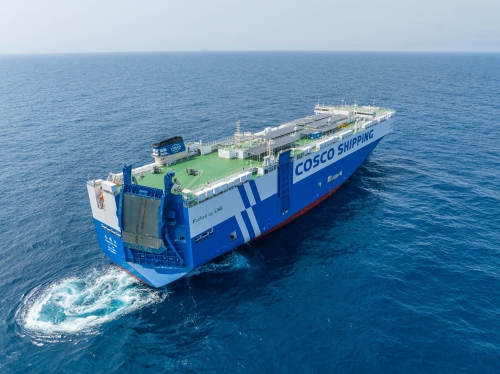
COSCO SHIPPING’s PCTC Fleet, fueled by relentless innovation, surmounts industry challenges. With 17 inventive patents to our name, including “Marine Cargo Intelligent Monitoring System and Its Testing Methods,” it has spearheaded international standards like “Fire monitoring and Alert Technology for Electric Vehicles on Ships and Its Testing Methods,” alongside issuing group standards such as “Ship Video Surveillance System Implementation Guide.”
With the successful delivery and maiden voyage of the “YUAN HAI KOU”, Yuanhai Auto Carrier’s fleet has burgeoned to 20 vessels, becoming China’s largest fleet dedicated to international auto transport. According to plan, COSCO SHIPPING aims to further expand its fleet. By 2026, the count of specialized car carriers is projected to escalate to 30.